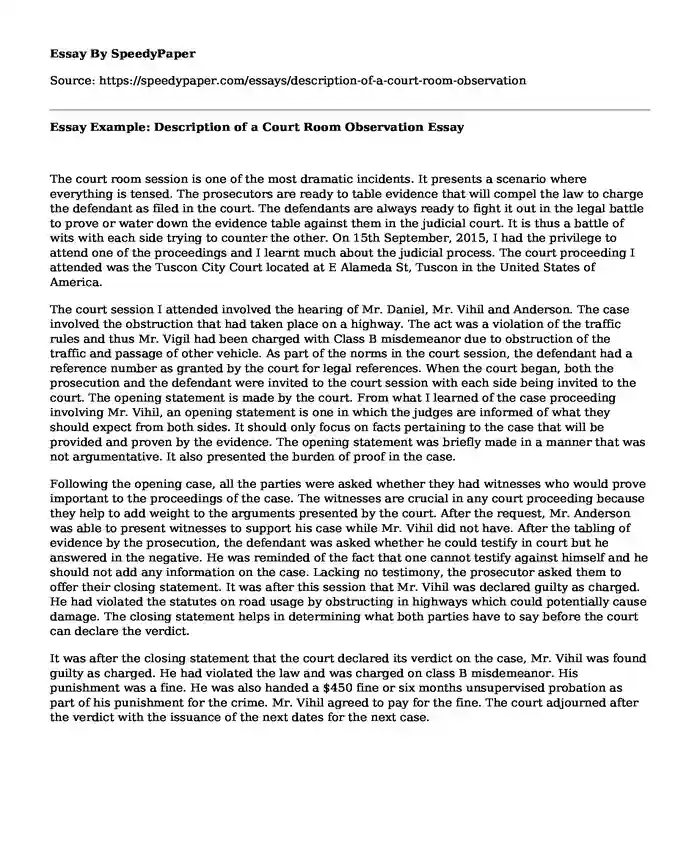
| Type of paper: | Essay |
| Categories: | Court system |
| Pages: | 3 |
| Wordcount: | 564 words |
The court room session is one of the most dramatic incidents. It presents a scenario where everything is tensed. The prosecutors are ready to table evidence that will compel the law to charge the defendant as filed in the court. The defendants are always ready to fight it out in the legal battle to prove or water down the evidence table against them in the judicial court. It is thus a battle of wits with each side trying to counter the other. On 15th September, 2015, I had the privilege to attend one of the proceedings and I learnt much about the judicial process. The court proceeding I attended was the Tuscon City Court located at E Alameda St, Tuscon in the United States of America.
The court session I attended involved the hearing of Mr. Daniel, Mr. Vihil and Anderson. The case involved the obstruction that had taken place on a highway. The act was a violation of the traffic rules and thus Mr. Vigil had been charged with Class B misdemeanor due to obstruction of the traffic and passage of other vehicle. As part of the norms in the court session, the defendant had a reference number as granted by the court for legal references. When the court began, both the prosecution and the defendant were invited to the court session with each side being invited to the court. The opening statement is made by the court. From what I learned of the case proceeding involving Mr. Vihil, an opening statement is one in which the judges are informed of what they should expect from both sides. It should only focus on facts pertaining to the case that will be provided and proven by the evidence. The opening statement was briefly made in a manner that was not argumentative. It also presented the burden of proof in the case.
Following the opening case, all the parties were asked whether they had witnesses who would prove important to the proceedings of the case. The witnesses are crucial in any court proceeding because they help to add weight to the arguments presented by the court. After the request, Mr. Anderson was able to present witnesses to support his case while Mr. Vihil did not have. After the tabling of evidence by the prosecution, the defendant was asked whether he could testify in court but he answered in the negative. He was reminded of the fact that one cannot testify against himself and he should not add any information on the case. Lacking no testimony, the prosecutor asked them to offer their closing statement. It was after this session that Mr. Vihil was declared guilty as charged. He had violated the statutes on road usage by obstructing in highways which could potentially cause damage. The closing statement helps in determining what both parties have to say before the court can declare the verdict.
It was after the closing statement that the court declared its verdict on the case, Mr. Vihil was found guilty as charged. He had violated the law and was charged on class B misdemeanor. His punishment was a fine. He was also handed a $450 fine or six months unsupervised probation as part of his punishment for the crime. Mr. Vihil agreed to pay for the fine. The court adjourned after the verdict with the issuance of the next dates for the next case.
Cite this page
Essay Example: Description of a Court Room Observation. (2021, Feb 11). Retrieved from https://speedypaper.net/essays/description-of-a-court-room-observation
Request Removal
If you are the original author of this essay and no longer wish to have it published on the SpeedyPaper website, please click below to request its removal:
- History of the Drug Trade in Korea
- International Business and the Ecological Imperative - Free Essay on Environmental Issues
- Catholic Crisis Points - Free Essay in Religion
- Free Essay about Social Media and Its Effects on Interaction Patterns
- Essay Example on Music and Art: Shaping Society Through the Ages
- Free Essay. Christian Perspective of the Nature of Spirituality and Ethics
- From Conformity to Liberation: The Evolution of American Women's Rights in the 1950s-70s - Essay Example
Popular categories




